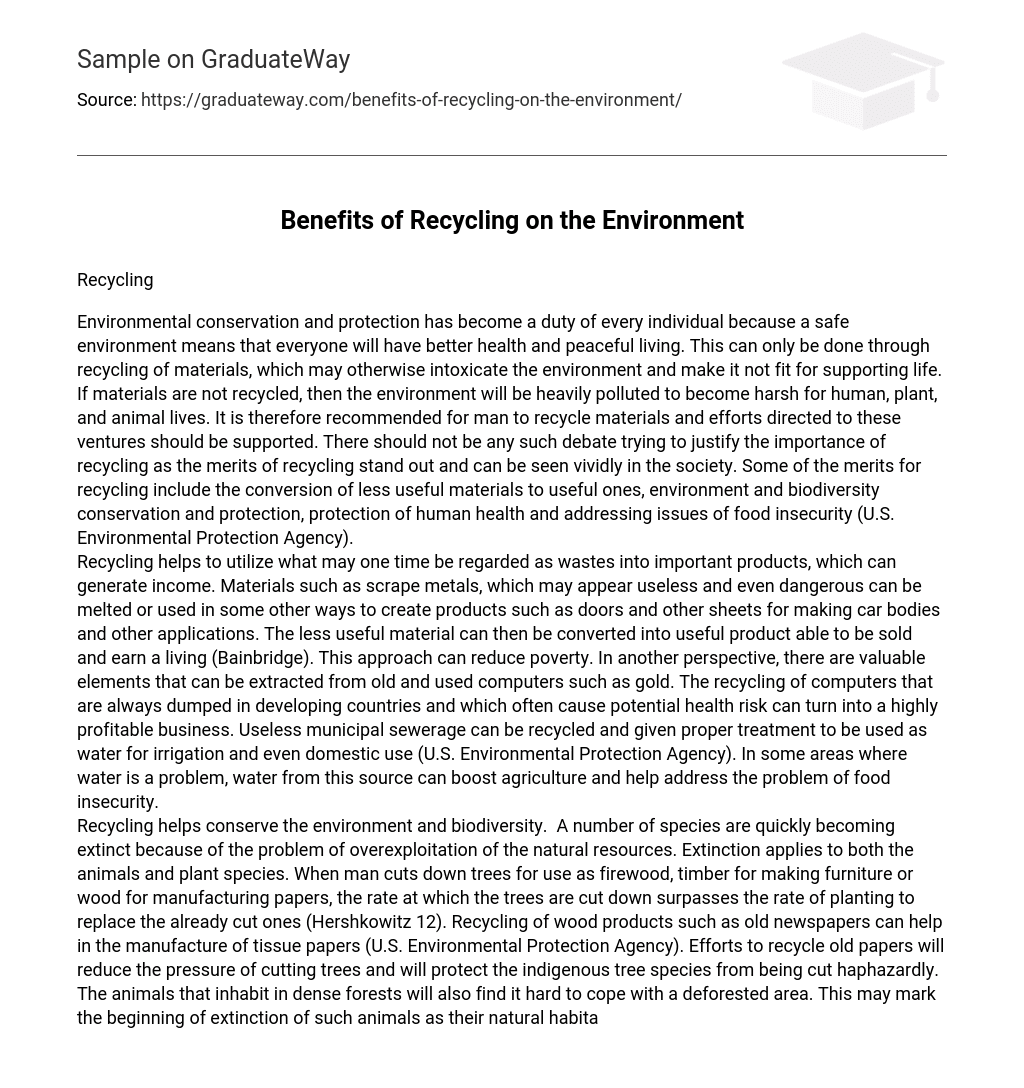Recycling
Environmental conservation and protection has become a duty of every individual because a safe environment means that everyone will have better health and peaceful living. This can only be done through recycling of materials, which may otherwise intoxicate the environment and make it not fit for supporting life. If materials are not recycled, then the environment will be heavily polluted to become harsh for human, plant, and animal lives. It is therefore recommended for man to recycle materials and efforts directed to these ventures should be supported. There should not be any such debate trying to justify the importance of recycling as the merits of recycling stand out and can be seen vividly in the society. Some of the merits for recycling include the conversion of less useful materials to useful ones, environment and biodiversity conservation and protection, protection of human health and addressing issues of food insecurity (U.S. Environmental Protection Agency).
Recycling helps to utilize what may one time be regarded as wastes into important products, which can generate income. Materials such as scrape metals, which may appear useless and even dangerous can be melted or used in some other ways to create products such as doors and other sheets for making car bodies and other applications. The less useful material can then be converted into useful product able to be sold and earn a living (Bainbridge). This approach can reduce poverty. In another perspective, there are valuable elements that can be extracted from old and used computers such as gold. The recycling of computers that are always dumped in developing countries and which often cause potential health risk can turn into a highly profitable business. Useless municipal sewerage can be recycled and given proper treatment to be used as water for irrigation and even domestic use (U.S. Environmental Protection Agency). In some areas where water is a problem, water from this source can boost agriculture and help address the problem of food insecurity.
Recycling helps conserve the environment and biodiversity. A number of species are quickly becoming extinct because of the problem of overexploitation of the natural resources. Extinction applies to both the animals and plant species. When man cuts down trees for use as firewood, timber for making furniture or wood for manufacturing papers, the rate at which the trees are cut down surpasses the rate of planting to replace the already cut ones (Hershkowitz 12). Recycling of wood products such as old newspapers can help in the manufacture of tissue papers (U.S. Environmental Protection Agency). Efforts to recycle old papers will reduce the pressure of cutting trees and will protect the indigenous tree species from being cut haphazardly. The animals that inhabit in dense forests will also find it hard to cope with a deforested area. This may mark the beginning of extinction of such animals as their natural habitats have been tampered with.
Human health is the most important and huge investments are directed to ensuring that man can have a healthy living environment. Recycling can reduce on the cost of healthcare expenses. The mercuric compounds that may be found in used electronics such as computers can expose humans to dangerous health risks such as brain disorders (Hershkowitz 17). Recycling computer parts can not only be viewed from the side of income gain but also from the health side, which will impact and shake the whole system of economy of a state. Materials that are dumped carelessly in the environment may be burnt as a solution to deal with environmental hazards. This approach may even worsen the situation as chemicals unfriendly to the ozone layer, which protects humans from the dangerous ultra-violet radiations, may be produced. The UV radiations damage the human DNA causing skin melanomas and other cancers (Hershkowitz 24). Recycling the materials in an appropriate way can then be the solution of preventing the cancers.
With the increasing food insecurity, recycling remains the intervention of choice in ensuring a stable food chain. Plastic bottles and papers that are carelessly thrown into the rivers and seas can cause suffocation of aquatic life (Bainbridge). The materials dumped in the seas prevent critical light from penetrating into the water and provide energy for the process of photosynthesis in aquatic plants (phytoplankton). The phytoplanktons serve as important source of food for fish, which man depends on for food. The most important human food found in the water is fish, which provides man with rich proteins that promote good health and fight hunger. Recycling of the plastic bottles and papers into products that can be reused such as the packaging containers and wrappers can help solve the menace of aquatic pollution (U.S. Environmental Protection Agency). Efforts to discourage recycling derail the goals to provide sufficient food for the ever increasing population of people.
All in all, recycling of materials should be encouraged in order to protect and conserve the environment, which is highly depended on by humans. It is the environment that supports the natural resources which provides for and supports life on the planet Earth. When this environment is abused through irresponsible dumping of waste materials without seeking special means of removing the materials, the once friendly environment can turn to be dangerous and a great enemy.
Works cited
Bainbridge, Ross “Benefits of Recycling.” Benefits of Recycling. 9 Nov. 2006. 24 Apr. 2010 <http://ezinearticles.com/?Benefits- Of- Recycling&id=354291>.
Hershkowitz, A. In Defense of Recycling. Social Research, 65 (1998): 12-32.
U.S. Environmental Protection Agency. “Wastes-Resource Conservation-Reduce, Reuse, Recycle.” Recycling. 6 Apr. 2010. 24 Apr. 2010. <http://www.epa.gov/wastes/conserve/rrr/recycle.htm>





